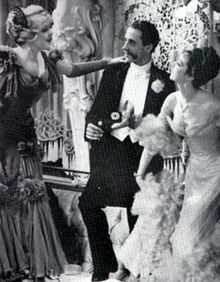Evergreen (film)
| Evergreen | |
|---|---|
 | |
| Directed by | Victor Saville |
| Produced by | Michael Balcon |
| Written by |
Marjorie Gaffney Emlyn Williams Benn W. Levy (Play) |
| Starring |
Jessie Matthews Sonnie Hale Barry MacKay Betty Balfour |
| Music by |
Richard Rodgers Lorenz Hart Harry M. Woods |
| Cinematography | Glen MacWilliams |
| Distributed by | Gaumont British |
| Release dates | April 1933 |
| Running time | 90 minutes |
| Country | United Kingdom |
| Language | English |
Evergreen is a 1934 Gaumont British musical film, starring Jessie Matthews as a music hall singer, based on the 1930 musical Ever Green, also starring Matthews. Matthews had a dual role as both mother and daughter.[1]
The film was produced by Michael Balcon and directed by Victor Saville. The music was by Rodgers and Hart.[2]
Plot
Set in the Edwardian era music halls of London, the popular singing star Harriet Green (Jessie Matthews) delights audiences with her coy rendition of Daddy Wouldn't Buy Me a Bow Wow; however she has an illegitimate baby daughter that she keeps secret from the public. Blackmailed into leaving the stage she moves to South Africa to raise her daughter quietly. Years later her daughter, Harriet Hawkes (played by Matthews again), looking remarkably like her mother, returns to London as a young show-biz hopeful. A handsome young publicity man Tommy Thompson (Barry MacKay), convinces a theater producer (Sonnie Hale) to star her in a new revue as the "remarkably preserved" original Harriet Green. The ruse works; however Harriet and Tommy have fallen in love, but the public believes Harriet is a well-preserved 60-year-old and Tommy is her son. The masquerade is revealed when Harriet does a strip-dance to the Harry M. Woods song Over My Shoulder.
Production
Capitalising on the success of Jessie Matthews' performance in the 1930 West End production of Rodgers and Hart's Ever Green musical, producer Michael Balcon engaged her for Emlyn Williams' film adaptation of Benn W. Levy's stage play. Harry M. Woods added four songs, dropping a number of the original Rodgers and Harts numbers.
RKO, Fred Astaire's Hollywood studio, prevented Balcon from engaging Astaire, who was then appearing in The Gay Divorce at London's Palace Theatre, and wanted to appear with Matthews. Contemporary reviews commented that such a partnership would be popular with critics and public.[3]
Even though Matthews was at the peak of her popularity at the time, she was near to a mental breakdown during the making of the film.[4] She credits director Victor Saville in her autobiography Over My Shoulder with giving her the support needed to complete the filming.
Cast
Jessie Matthews the popular English actress, dancer, and singer of the 1930s had a dual role as music hall star Harriet Green and her daughter Harriet Hawkes. Matthew's real life husband, Sonnie Hale, played the worried theatre producer Leslie Benn. The love interest, publicity man Tommy Thompson, was acted by Barry MacKay. The other main parts are - Maudie, played by Betty Balfour, Marquis of Staines by Ivor MacLaren and Treadwell by Hartley Power.
Reception
Popular in its day, the film has retained critical and contextual attention due to a strong plot, energetic performances and catchy Rodgers and Hart numbers comparable to "the best Astaire/Rodgers or Busby Berkeley films"; it is regarded as director Victor Saville's most worthy work.[5]
Success in America resulted in MGM making an offer of a big Hollywood role which Gaumont British would not release her to as she was too valuable to the British studio.[citation needed]
References
Notes
- ↑ "Evergreen". Time Out London. Retrieved 2008-03-27.
- ↑ Dave Kehr. "Evergreen Capsule". Chicago Reader. Retrieved 2008-03-27.
- ↑ Sennwald, Andre (1935-01-11). "THE SCREEN; Jessie Matthews in "Evergreen," a Pleasing Screen Musical From England, at the Music Hall". The New York Times.
- ↑ Evergreen Review. Movie Reviews - Film - Time Out London
- ↑ DVDLaser: the largest database of DVD reviews on the web
Bibliography
- The Great British Films, Jerry Vermilye, 1978, Citadel Press, ISBN 0-8065-0661-X
- Over My Shoulder - An Autobiography, Jessie Matthews, 1974, W.H. Allen, ISBN 0-491-01572-0
External links
- Evergreen at the Internet Movie Database
- Evergreen is available for free download at the Internet Archive [more]
| |||||